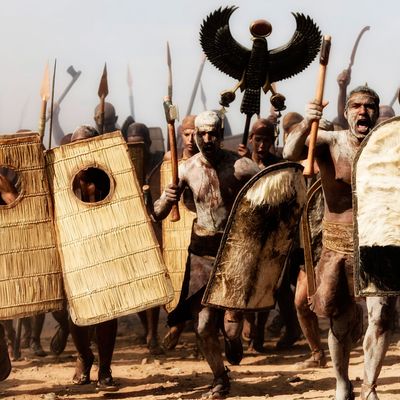
Remember that song from Mary Poppins, “A Spoonful of Sugar”? The History Channel built a brand on it. Then, over the last decade or so, the network (which is now called just History, but we’ll use its old name to avoid confusion) upped the ratio, to the point where they aren’t giving us spoonfuls of sugar with our informational medicine, but hiding the pills in two liter vanilla milkshakes smothered with chocolate sauce, whipped cream and sprinkles.
Exhibit A is Mankind: The Story of All of Us, which debuts tonight.
Actually, maybe I should refer to it as Exhibit B, because it’s a kinda-prequel to 2010’s America: The Story of Us. It has many contributors in common and employs the same aesthetic, which could be summed up as Education: The SuperBowl Trailer. A narrator (the somewhat dude-sounding Josh Brolin, replacing Liev Schreiber) summarizes technological developments that drove, and were driven by, history, while the screen fills up with the glitziest re-enactments, special effects, and info-graphics money can buy.
The folks behind this show never take a simple approach when a spectacularly cheesy one will suffice. For instance, tonight’s two-part premiere (which covers African pre-history through pre-Christian developments in Athens and China) briefly discusses how Qin Shi Huang, the first emperor to unify China, started building what would later be known as the Great Wall. As Brolin narrates, the camera whooshes over a computer-animated mockup of the Wall as it’s being built, the stones flying into place. Twenty or even ten years ago, filmmakers might have illustrated this part of the episode with footage of the actual Great Wall, or artists’ renderings of its construction. Now we zoom over it at warp speed while it materializes as if by magic. Why? Duh, because it’s more awesome. (America: The Story of Us depicted the building of the transcontinental railroad in much the same way, as if it were the prelude to a videogame level.)
Mankind’s numerous combat scenes are conceived in the trashy-excessive spirit of Gladiator: infantry carnage photographed to look like a truck commercial. Unmotivated zooms, staccato editing, and jittery camerawork abound. The sound effects are comically overwrought. Every infantry charge sounds like a buffalo stampede. Every sword thrust evokes a butcher knife being driven into a casaba melon. The Wilhelm scream makes at least one appearance. So do such experts as Anthony Bourdain (on the roots of cooking), Dr. Mehmet Oz (on livestock and infectious diseases) and Brian Williams (on — well, I was never quite sure why they included him; but as always, he’s charming and looks great). The gender-specific title (why not “humankind”?) gives you a sense of what you’re in for. This is History Channel history, i.e. Guy Movie History: war, war, and more war, with a bit of disease, famine and technological innovation thrown in for variety. The first two hours have few female historians and barely any acknowledgment of the importance of women in history, save for a section on hunter-gatherers and a brief moment in the second hour in which a barbarian rapes a woman in a tent (offscreen).
The series’ bludgeoning aesthetic is silly, but it works. Much of History’s programming aims to intrigue viewers who might never crack open a book, while assuring literate history buffs that the filmmakers know what they’re talking about — that there’s medicine in the milkshake. Mankind is the essence of the History Channel. I zoned out a few times because the nonstop sound of swords clanging and extras wailing, “AiiieEEEEE!” makes me sleepy, and because other TV series have covered technological history with more imagination. (My favorite is James Burke’s 1978 series Connections, he wrote, revealing himself as an old fuddy-duddy.) Nevertheless, full disclosure compels to admit that my 8-year-old boy loved it. He resisted watching the series with me at first (“This isn’t a school day,” he explained), viewed the first hour with folded arms, stuck around for hour two, then got himself a notepad started drawing pictures of crossbows and soldiers with arrows in their faces. Mission accomplished.





